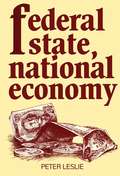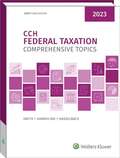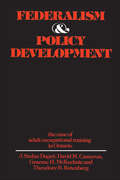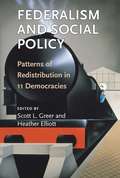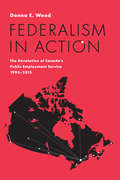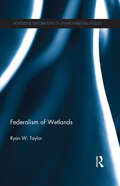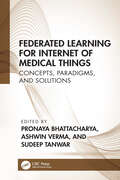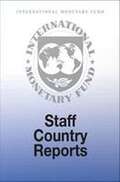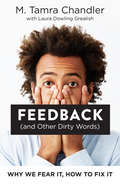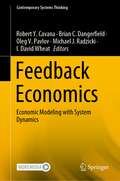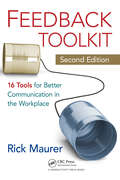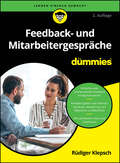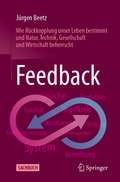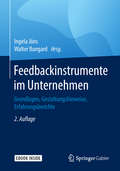- Table View
- List View
Federal State, National Economy (The Royal Society of Canada Special Publications)
by Peter LeslieAs free trade talks continue uncertainly, as Ottawa and Washington toss protective tariffs at each other's goods, and as the provinces continue to disagree among themselves and with the federal government, the search for a national economic policy goes on. A critical element in that search is the balance between regional needs and federal priorities. Peter Leslie's interpretive essay provides a context in which to view the political and economic forces that make up that delicate balance, including those highlighted in the report of the Macdonald Commission. He discusses the nature of Canada's federal system and its relevance to policy, especially in the economic sphere, where differential effects among regions are often difficult to avoid.Leslie offers a thoughtful appraisal of a historically complex set of relationships and suggests the ways in which it will determine strategy in an area that will continue to occupy political centre-stage in Canada for some time to come.
Federal Taxation in America
by W. Elliot BrownleeThis authoritative and readable survey is a comprehensive historical overview of federal taxation and fiscal policy in the United States, extending from the era of the American Revolution to the present day. Brownlee relates the principal stages of federal taxation to the crises that led to their adoption, including but not limited to: the formation of the republic, the Civil War, World War I and II, and the challenges to government that took hold during the 1980s. In this third edition, Brownlee adds four new chapters covering the colonial era, the American Revolution, the Civil War, the 1920s, and the post-1945 era including the tax policies of the George W. Bush and Barack Obama administrations. It features expanded discussion of government expenditures, deficits and debt, public resources, counter-cyclical fiscal policy, and state and local taxation. Its interdisciplinary interpretation makes it perfect for scholars, graduate students and advanced undergraduate students.
Federal Taxation of Corporations and Shareholders
by Boris I. Bittker James S. EusticeOriginally published: Hamden, Conn.: Federal Tax Press, 1959.
Federal Taxation: Comprehensive Topics (2023)
by Edward FothFederal Taxation Comprehensive Topics is a popular teacher-created combination first- and second-level tax course that offers comprehensive one-volume coverage of all the most important tax concepts and principles for a solid grounding in federal taxation. It offers clear and concise explanation of fundamental tax concepts in the framework of today's tax practice. Covering both planning and compliance, the book strikes an effective balance between AICPA model curriculum demands and the favored approaches of the majority of today's top tax teachers. Comprehensive Topics introduces students to the complex and absorbing study of federal taxation, covering a broad range of subjects beginning with basic concepts and individual taxation. Once the fundamentals are covered, tax accounting and the taxation of partnerships and corporations become the focus. The final section of the book presents estate and gift taxation coverage, along with income taxation of trusts and estates. Deferred compensation and education savings plans are also addressed. Written by top tax teachers from across the country, Federal Taxation: Comprehensive Topics presents materials in straightforward language to improve student comprehension. Emphasis is given to the most important topics that have the greatest real-world impact.
Federal Trade Commission Privacy Law and Policy
by Chris Jay HoofnagleThe Federal Trade Commission, a US agency created in 1914 to police the problem of 'bigness', has evolved into the most important regulator of information privacy - and thus innovation policy - in the world. Its policies profoundly affect business practices and serve to regulate most of the consumer economy. In short, it now regulates our technological future. Despite its stature, however, the agency is often poorly understood by observers and even those who practice before it. This volume by Chris Jay Hoofnagle - an internationally recognized scholar with more than fifteen years of experience interacting with the FTC - is designed to redress this confusion by explaining how the FTC arrived at its current position of power. It will be essential reading for lawyers, legal academics, political scientists, historians and anyone else interested in understanding the FTC's privacy activities and how they fit in the context of the agency's broader consumer protection mission.
Federalism and Policy Development: The Case of Adult Occupational Training in Ontario
by David Cameron Graeme Mckechnie J. Stefan Dupre Theodore RotenbergIn 1966 the Canadian government announced the abrupt termination of a longstanding conditional grant relationship with the provinces in the domain of technical and vocational education. It sought to substitute a radically new arrangement whereby it would purchase occupational training for adults as an integral part of an over-all manpower policy. This book examines what ensued with particular reference to the province of Ontario and offers unique insights into the conduct of federal-provincial relations from the level of first ministers through that of operating officials down to the grass roots of individual Canadian communities. It also assesses the opportunities and limitations attendant upon a major departure in manpower policy. By focusing on the role of public servants with quite distinct professional orientations – economists and educationists – the book yields new insights into the contribution of appointed specialists to policy development.
Federalism and Social Policy: Patterns of Redistribution in 11 Democracies
by Scott L Greer Heather ElliottFederalism and Social Policy focuses on the crucial question: Is a strong and egalitarian welfare state compatible with federalism? In this carefully curated collection, Scott L. Greer, Heather Elliott, and the contributors explore the relationship between decentralization and the welfare state to determine whether or not decentralization has negative consequences for welfare. The contributors examine a variety of federal countries, including Spain, Canada, and the United Kingdom, asking four key questions related to decentralization: (1) Are there regional welfare states (such as Scotland, Minnesota, etc.)? (2) How much variation is there in the structures of federal welfare states? (3) Is federalism bad for welfare? (4) Does austerity recentralize or decentralize welfare states? By focusing on money and policy instead of law and constitutional politics, the volume shows that federalism shapes regional governments and policies even when decentralization exists.
Federalism in Action: The Devolution of Canada’s Public Employment Service, 1995-2015 (IPAC Series in Public Management and Governance)
by Donna E. WoodEvery developed country has a public employment service that connects job seekers with employers through information, placement, and training support services. In Federalism in Action, Donna E. Wood assesses how Canada’s public employment service is performing after responsibility was transferred from the federal government to provinces, territories, and Aboriginal organizations between 1995 and 2015. Drawing upon over twenty years of data, Wood reveals the governance choices provinces made, the reasons behind these choices, and the outcomes they achieved. Provincial decisions regarding employment programming is an important public policy issue about which little is known, and even less understood within the context of Aboriginal communities. Federalism in Action includes analytical comparisons of Canada’s employment programming with the United States, Australia, and the European Union, as well as information from insightful interviews with key informants from every province. In firmly placing Canada within the extensive international literature on the governance of welfare-to-work policies, this book makes an important new contribution to research.
Federalism of Wetlands: Federalism Of Wetlands (Routledge Explorations in Environmental Studies)
by Ryan W. TaylorThis book investigates the consequences of redundant state and federal environmental regulations in the United States. Drawing on the most exhaustive statistical analysis of US federal wetland permits ever constructed, the book uncovers the disjointed world of wetland regulation. The author starts by examining the socioeconomic and environmental factors driving individuals to apply for environmental regulatory permits and the regional inconsistencies encountered in federal environmental regulatory program performance. The book goes on to demonstrate that states have more power in federal relationships than scholars often believe and that individual state policies are important even in a time of strong federal governance. Evidence shows that such intergovernmental redundancy serves to increase overall regulatory program effectiveness. This book breaks new ground in the subjects of federalism and environmental regulation by rejecting the traditional approach of picking winners and losers in favour of a nuanced demonstration of how redundancy and collaboration between different levels of governance can make for more effective governmental programs. The book is also innovative in its use of the perspectives of regulated citizens not as a point of judgment, but as a means of introducing a constructive new way of thinking about political and administrative boundaries within a federalist system of governance. The book provides relevant context to wider political debates about excessive and duplicative regulatory oversight and will be of interest to Environmental Policy students and administrators.
Federated Industries (A)
by Robert J. DolanThe market leader in an overcapacity industry with a commodity product is trying to restore industry price levels. Price cutting has hurt overall industry price levels and the leader must determine whether (and how) to bring up price levels or exit the market.
Federated Learning for Internet of Medical Things: Concepts, Paradigms, and Solutions
by Sudeep Tanwar Pronaya Bhattacharya Ashwin VermaThis book intends to present emerging Federated Learning (FL)-based architectures, frameworks, and models in Internet of Medical Things (IoMT) applications. It intends to build on the basics of the healthcare industry, the current data sharing requirements, and security and privacy issues in medical data sharing. Once IoMT is presented, the book shifts towards the proposal of privacy-preservation in IoMT, and explains how FL presents a viable solution to these challenges. The claims are supported through lucid illustrations, tables, and examples that present effective and secured FL schemes, simulations, and practical discussion on use-case scenarios in a simple manner. The book intends to create opportunities for healthcare communities to build effective FL solutions around the presented themes, and to support work in related areas that will benefit from reading the book. It also intends to present breakthroughs and foster innovation in FL-based research, specifically in the IoMT domain. The emphasis of this book is on understanding the contributions of IoMT to healthcare analytics, and its aim is to provide insights including evolution, research directions, challenges, and the way to empower healthcare services through federated learning. The book also intends to cover the ethical and social issues around the recent advancements in the field of decentralized Artificial Intelligence. The book is mainly intended for undergraduates, post-graduates, researchers, and healthcare professionals who wish to learn FL-based solutions right from scratch, and build practical FL solutions in different IoMT verticals.
Federated States of Micronesia: Statistical Appendix
by International Monetary FundA report from the International Monetary Fund.
Feed-in Tariffs and the Economics of Renewable Energy
by Yoshihiro YamamotoThis book offers a theoretical model of feed-in tariffs and provides different investigations into the promotion of renewable energy. The first part of the book proposes a model to investigate feed-in tariffs, that is, how to set a price for the electricity generated from renewable energy sources and fed into the power grid. The second part examines other important features of renewable energy development, such as uncertainty, diffusion of innovation, partnership among relevant parties, and community. Aiming for applicable results, this book provides a theoretical basis for the design of an effective, efficient, and tractable system for promoting renewable energy. This book is meant for researchers, policy makers, graduate students, and anyone interested in the economic and social aspects of renewable energy development.
Feed-in tariffs in the European Union
by Alain Nadaï Béatrice CointeThis book is a sociological account of the historical trajectory of feed-in tariffs (FITs) as an instrument for the promotion of renewable energy in Europe. Chapters analyse the emergence and transformations of feed-in tariffs as part of the policy arsenal developed to encourage the creation of markets for RES-E in Europe. The authors explore evolving conceptions of renewable energy policy at the intersection between environmental objectives, technological change and the ambition to liberalise the internal electricity market. They draw conclusions on the relationships between markets and policy-making as it is instituted in the European Union, and on the interplay between the implementation of a European vision on energy and national politics. Distinctive in both its approach and its methods the books aim is not to discuss the design of feed-in tariffs and their evolution, nor is it to assess their efficiency or fairness. Instead, the authors seek to understand what makes feed-in tariffs what they are, and how this has changed over time.
Feedback (and Other Dirty Words): Why We Fear It, How to Fix It
by M. Tamra Chandler Laura Dowling GrealishA practical and irreverent guide to taking the sting out of feedback and reclaiming it as a motivating, empowering experience for everyone involved. Feedback: the mere mention of the word can make our blood pressure rise and our defenses go up. For many of us, it's a dirty word that we associate with bias, politics, resentment, and self-doubt. However, if we take a step back and think about its true intent, we realize that feedback needn't be a bad thing. After all, understanding how others experience us provides valuable opportunities to learn and grow. Authors M. Tamra Chandler and Laura Grealish explain how feedback got such a bad rap and how to recognize and minimize the negative physical and emotional responses that can erode trust and shut down communication. They offer a new and more ambitious definition of feedback, explore the roles we each play as Seeker, Extender, and Receiver, and introduce the three Fs of making feedback focused, fair, and frequent. You'll also find valuable exercises and strategies, along with real-world examples that illustrate how you can put these ideas into action and join in the movement to fix feedback, once and for all.When it's done right, feedback has been proven to be the most effective means of improving communication and performance for you and your organization. It's too important to give up, and with Chandler and Grealish's help, you'll be able to use it deftly, equitably, and effectively.
Feedback Economics: Economic Modeling with System Dynamics (Contemporary Systems Thinking)
by Robert Y. Cavana Brian C. Dangerfield Oleg V. Pavlov Michael J. Radzicki I. David WheatThis book approaches economic problems from a systems thinking and feedback perspective. By introducing system dynamics methods (including qualitative and quantitative techniques) and computer simulation models, the respective contributions apply feedback analysis and dynamic simulation modeling to important local, national, and global economics issues and concerns. Topics covered include: an introduction to macro modeling using a system dynamics framework; a system dynamics translation of the Phillips machine; a re-examination of classical economic theories from a feedback perspective; analyses of important social, ecological, and resource issues; the development of a biophysical economics module for global modelling; contributions to monetary and financial economics; analyses of macroeconomic growth, income distribution and alternative theories of well-being; and a re-examination of scenario macro modeling.The contributions also examine the philosophical differences between the economics and system dynamics communities in an effort to bridge existing gaps and compare methods. Many models and other supporting information are provided as online supplementary files. Consequently, the book appeals to students and scholars in economics, as well as to practitioners and policy analysts interested in using systems thinking and system dynamics modeling to understand and improve economic systems around the world."Clearly, there is much space for more collaboration between the advocates of post-Keynesian economics and system dynamics! More generally, I would like to recommend this book to all scholars and practitioners interested in exploring the interface and synergies between economics, system dynamics, and feedback thinking." Comments in the Foreword by Marc Lavoie, Emeritus Professor, University of Ottawa and University of Sorbonne Paris Nord
Feedback Toolkit: 16 Tools for Better Communication in the Workplace, Second Edition
by Nigel Hooper Rick MaurerThis book provides expert guidance on using feedback as a performance improvement tool. It includes many simple tools readers can use to improve feedback in their work unit. The book suggests that feedback works best when the giver and receiver realize that they are in a dance together.
Feedback and Learning (Using the Balanced Scorecard to Create a Strategic Feedback System)
by Robert S. Kaplan David P. NortonAligning strategy and targets, initiatives, and budgets puts the organization in motion. Performance must then be monitored and guided to close the feedback loop by managers who must also determine whether their strategy is still valid. This chapter emphasizes that companies that are stretching for high performance need strategic feedback systems and management processes to verify that their strategy remains on course to a profitable future.
Feedback and the Strategic Learning Process
by Robert S. Kaplan David P. NortonThe capacity for organizational learning at the executive level (or what is referred to as strategic learning) is perhaps the most innovative aspect of the Balanced Scorecard. This chapter examines a process of feedback, analysis, and reflection that tests and adapts the strategy to emerging conditions, closing the circle of a complete strategic management system. This chapter was originally published as chapter 11 of "The Balanced Scorecard: Translating Strategy into Action."
Feedback- und Mitarbeitergespräch für Dummies (Für Dummies)
by Rudiger KlepschSo motivieren Sie Ihre Mitarbeiter und werden ein besserer Chef Ohne Kommunikation geht nichts im Berufsalltag. Feedback soll motivieren und dem Empfänger Orientierung bieten, in Mitarbeitergesprächen stecken Sie die Ziele Ihres Teams ab. Doch zur richtigen Zeit den richtigen Ton zu finden ist gar nicht so leicht. Dr. Rüdiger Klepsch zeigt Ihnen, wie Sie verschiedene Mitarbeitergespräche optimal vorbereiten und durchführen, sodass Sie es schaffen, auch heikle Situationen angemessen zu gestalten. Auch zum Thema hybride Gespräche finden sich wertvolle Tipps. Zahlreiche Checklisten und Fragebogen unterstützen Sie bei der Vorbereitung, Durchführung und Auswertung. Sie erfahren Wie Sie Kritikgespräche und Leistungsbeurteilungen optimal vorbereiten Wie Sie Ihr Team durch gezieltes Feedback inspirieren und motivieren Welche Fallen Sie bei hybriden Gesprächen vermeiden sollten
Feedback: Wie Rückkopplung unser Leben bestimmt und Natur, Technik, Gesellschaft und Wirtschaft beherrscht
by Jürgen BeetzFeedback wird im breiteren Sinne als Rückkopplung verstanden, nicht nur als verbale Rückmeldung. Rückkopplung ist das Rückführen der Wirkung auf die Ursache – und die verblüffenden Effekte sind in allen Lebensbereichen anzutreffen.Der Wissenschaftsautor Jürgen Beetz spricht Sie als Leser direkt an und entdeckt mit IhnenGeschichten des Alltags mit merkwürdigen Feedback-Effekten,die Selbstbezüglichkeit und die daraus entstehenden Widersprüche,die Eigenschaften komplexer dynamischer vernetzter Systeme,das Wesen der Rückkopplung, das aus diesen Bedingungen hervorgeht,Rückkopplungseffekte in der Technik, der Natur, der Gesellschaft, der Politik, der Wirtschaft ... und im Rest der Welt,das „mächtigste Konzept der Welt“, die Evolution.Sie verstehen, was passiert, wenn die Wirkung zur Ursache wird. Rückkopplung bestimmt unser Leben. Sie scheint oft im Verborgenen zu wirken. Wir bemerken sie erst, wenn sie ihr Werk schon getan hat. Manchmal voller Zufriedenheit, wenn sie stabilisierend war, aber oft mit Schrecken, wenn sie sich in einem „Teufelskreis“ aufgeschaukelt hat. Noch weniger ahnen wir, wie schwer sie oft zu durchschauen oder gar zu beherrschen ist. Aktuelle Krisen mit oft hochkomplexen Rückkopplungen führen uns das täglich vor Augen. Nach der Lektüre dieses Buches sehen Sie genauer hin.Das Werk ist in der zweiten Auflage vollständig durchgesehen und erweitert. Hinzugefügt wurde ein Abschnitt über das dynamische Verhalten von Systemen.Stimmen zur ersten Auflage„Ein wichtiges Buch, das ein zentrales Element kreativer Entwicklungen in Natur und Gesellschaft in all seinen Facetten beleuchtet.“Prof. Dr. Bernd-Olaf Küppers, Friedrich-Schiller-Universität Jena „Dieses Buch beschreibt sehr anschaulich, dass Systeme in Natur, Technik und Gesellschaft ohne Feedbacknicht – oder nur sehr ineffizient – funktionieren könnten. Es zeigt, dass Rückkopplung ein zentrales Prinzip darstellt, das das Verhalten von Systemen zum Besseren (bei falschem Gebrauch aber auch zum Schlechteren) verändern kann. Es ist deshalb eminent wichtig, die Bedeutung und das Potential dieses Prinzips zu erfassen. Dies ermöglicht dieses Buch in leicht lesbarer Weise.“Prof. Dr. Jörg Raisch, Technische Universität Berlin, Fachgebiet Regelungssysteme, Max-Planck-Institut für Dynamik komplexer technischer SystemeDer AutorJürgen Beetz studierte nach einer humanistischen und naturwissenschaftlichen Schulausbildung Elektrotechnik, Mathematik und Informatik an der TH Darmstadt und der University of California, Berkeley. Bei einem internationalen IT-Konzern war er als Systemanalytiker, Berater und Dozent in leitender Funktion tätig. Von ihm sind im selben Verlag „1+1=10: Mathematik für Höhlenmenschen“ sowie „E=mc²: Physik für Höhlenmenschen“ erschienen.
Feedbackinstrumente im Unternehmen: Grundlagen, Gestaltungshinweise, Erfahrungsberichte
by Ingela Jöns Walter BungardDies ist das erste Buch, das Feedbackinstrumente und Feedbackprozesse in Unternehmen umfassend behandelt. Das Autorenteam gibt konkrete Gestaltungshinweise und schildert Beispiele aus renommierten Unternehmen (BMW, Continental, Lufthansa, SAP ...).
Feeding America (A)
by Scott Duke Kominers Alan LamThis case describes how Feeding America, the third-largest nonprofit organization in the US, designed a marketplace for allocating donated food across its network of food banks. It considers the promises and pitfalls of using market-based allocation in the context of a centralized artificial currency market, and evaluates the importance of different design components in making the marketplace efficient and fair for all participants.
Feeding Britain: Our Food Problems and How to Fix Them (Pelican Books)
by Tim LangHow does Britain get its food? Why is our current system at breaking point?How can we fix it before it is too late?British food has changed remarkably in the last half century. As we have become wealthier and more discerning, our food has Europeanized (pizza is children's favourite food) and internationalized (we eat the world's cuisines), yet our food culture remains fragmented, a mix of mass 'ultra-processed' substances alongside food as varied and good as anywhere else on the planet.This book takes stock of the UK food system: where it comes from, what we eat, its impact, fragilities and strengths. It is a book on the politics of food. It argues that the Brexit vote will force us to review our food system. Such an opportunity is sorely needed. After a brief frenzy of concern following the financial shock of 2008, the UK government has slumped once more into a vague hope that the food system will keep going on as before. Food, they said, just required a burst of agri-technology and more exports to pay for our massive imports.Feeding Britain argues that this and other approaches are short-sighted, against the public interest, and possibly even strategic folly. Setting a new course for UK food is no easy task but it is a process, this book urges, that needs to begin now.'Tim Lang has performed a public service' Simon Jenkins, Sunday Times
